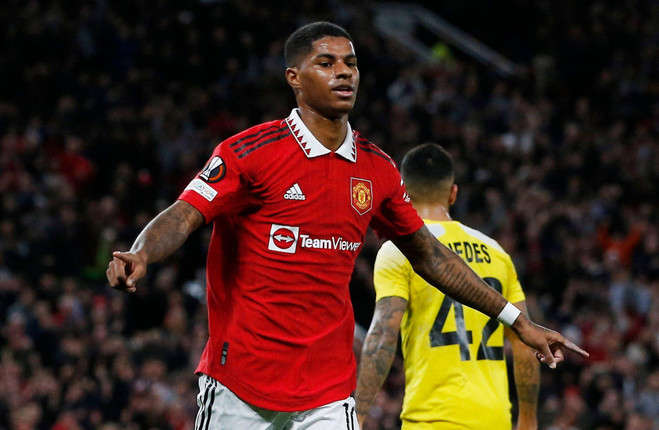CHELSEA COCKED A couple of eyebrows by including a link to Mykhaylo Mudryk’s personal Instagram account in the bio section of their own account when they were wrapping up the signing of the Ukraine international earlier this month.
The reaction was likely the entire point, given they felt it was a signing of such awesome significance that they announced it during a game against Crystal Palace. But the publicity trick also accentuated the growing primacy of players’ individual social media accounts in an age where the draw of individual footballers has never been greater.
Running social media accounts has become an important part of a footballer’s career, though increasingly fewer are doing it by themselves. Instead, it becomes a job for their agency.
Sam Bailey is Head of Marketing at the agency Unique Sports Group, whom he joined from the Jay-Z-founded agency Roc Nation. Unique’s stable of clients includes Irish internationals Adam Idah and Dara O’Shea along with Chelsea’s Reece James and Bayern Munich’s Dayot Upamecano.
Just as players and clubs will employ specialists in various different fields, he says, so do players for their social media accounts.
“There has always been a debate from senior pros-turned-pundits around people managing players’ social media, in that sense it is quite scrutinised”, he tells The42. ”We try to understand more about their client, who they are and what they want to achieve in the long-term, and put around them a team of professional experts who can help them get to where they want to be.”
The agency usually clicks publish – it helps avoid some Victor Anichebe-style, can-you-tweet-something-like mishaps – but Bailey says everything posted is pre-approved by the player in question. The agency’s commitment, he says, is to project the player’s authentic personality.
“With any idea, authenticity is the most important thing. If it isn’t something a player believes in, people can see through it.
“It’s not rocket science in the beginning. It’s not, ‘We will get you to a million followers inside a year’, or anything like that. We will look at where the player is in their career, and then we start to understand a bit more about their personality. What makes them tick, what is their backstory, how have they got to where they are? What they are passionate about? We knit that story together, so they can focus on what the most important thing is, which is performing every week on the pitch.”
Grimly, the agency can also act as somewhat of a firewall between the player and online abuse, cultivating direct links with social media platforms in order to try and tackle the worst comments. The sewers that become of comments sections have repelled some players from joining social media, but there are cold business reasons for signing up.
“Players are business people too, and have business minds”, says Bailey. “People always forget that while players at the top level are paid high sums of money but at the end of the career, it doesn’t slope down, it drops. There always has to be one eye on what a player does post-career.
“Brands are becoming smarter now as to how they are spending their money: again they are not looking at what it costs for a post or just for the best billboard, but what value they can get as a partnership. That goes back to who the player is: what they stand for, and how they hold themselves.”
There have been plenty of high-profile examples of players using social media platforms for reasons beyond the transactional. Bailey has previously worked with Marcus Rashford (at RocNation) and Raheem Sterling (at Colossal Sports Management), both of whom spoke out on topics of far greater import than the game itself.
Days after he was racially abused by a Chelsea supporter while playing for Manchester City in 2018, Sterling took to Instagram to juxtapose two headlines from the UK Daily Mail, accusing the British media of “fuelling racism.”
Sterling compared a headline about Tosin Adarabioyo that read ‘Young Manchester City footballer, 20, on £25,000 a week splashes out on mansion on market for £2.25m despite having never started a Premier League match’ with the headline on another story about Phil Foden: ‘Foden buys new £2m home for his mum’.
“You have two young players starting out their careers – both play for the same team, both have done the right thing, which is buy a new house for their mothers who have put in a lot of time and love into helping them get where they are,” wrote Sterling. “But look at how the newspapers get their message across for the young black player and then for the young white player. I think this is unacceptable, both innocent, have not done a thing wrong but just by the way it has been worded. The young black kid is looked at in a bad light. Which helps fuel racism an[d] aggressive behaviour.”
Rashford, meanwhile, famously triggered a rapid UK government u-turn in 2020 following his campaign to extend access to free school meals to include school holidays. A lesser impact of both instances has been their contribution to a changing perception of footballers in the UK: players are no longer expected to express opinions on nothing outside of football. Bailey says this is partly a result of the growing American influence on English football.
“Players used to be afraid of their platforms, and afraid of saying the wrong thing in case of a backlash. Now it’s the other way around: it’s seen as a way of showing who they really are. It has been happening in America for some time, but the fact it’s now happening more and more frequently over here is something that shouldn’t be taken lightly.
“What I admire the most about the American market is the openness and the honesty. The way they do things, how they have taken a stand against things they do not believe in, within sport and outside of sport, is very inspiring. Colin Kaepernick is the main one which jumps to mind: when he took the knee it was huge news for all the right reasons. That is a market you can’t stop, a force that can’t be reckoned with. And with the World Cup being there in 2026, soccer is on the up.”
That American influence is pervasive in England now, seen most obviously in the fact that eight of the 20 Premier League clubs have American owners. Some of the largest player agencies in England are now also being bought out by American consortiums, with the Stellar Group bought by the American talent agency ICM Partners in 2020. (This means that Jack Grealish and Beyonce are now technically under the same representation.)
Bailey’s Unique group are, well, increasingly unique in remaining independent, but their players’ confidence in expressing themselves online itself signifies a shifting landscape.


